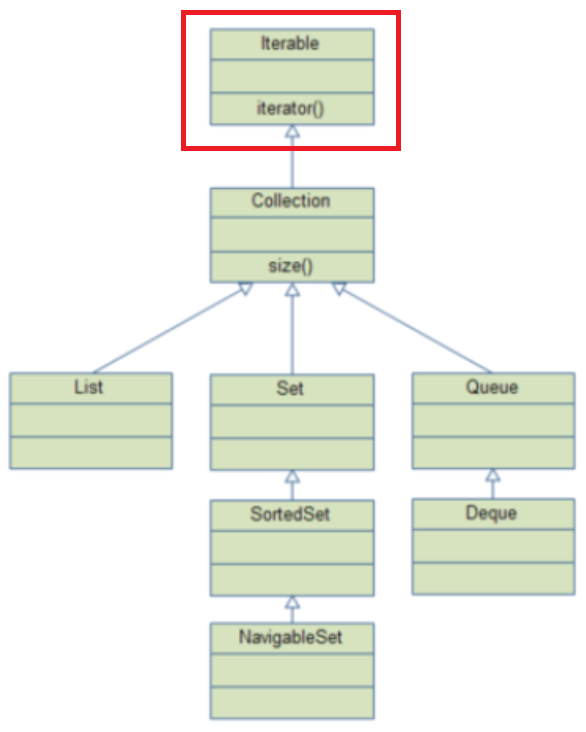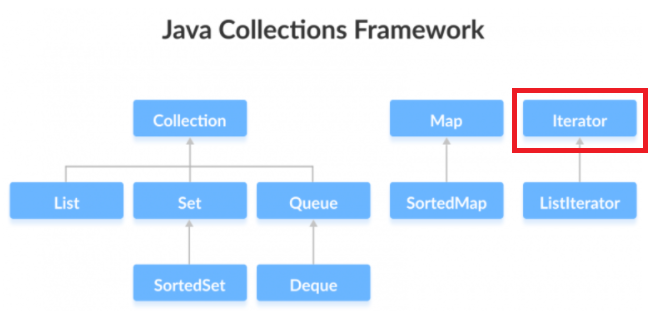Iterable 인터페이스

Collection 인터페이스의 상위 인터페이스는 Iterable 이다.
1
2
3
4
5
6
7
8
9
10
11
12
13
14
15
16
17
18
19
20
21
22
23
24
25
26
27
28
29
30
31
32
33
34
35
36
37
38
39
|
package java.lang;
public interface Iterable<T> {
/**
* Returns an iterator over elements of type {@code T}.
*
* @return an Iterator.
*/
Iterator<T> iterator();
/**
* Performs the given action for each element of the {@code Iterable}
* until all elements have been processed or the action throws an
* exception. Actions are performed in the order of iteration, if that
* order is specified. Exceptions thrown by the action are relayed to the
* caller.
* <p>
* The behavior of this method is unspecified if the action performs
* side-effects that modify the underlying source of elements, unless an
* overriding class has specified a concurrent modification policy.
*
* @implSpec
* <p>The default implementation behaves as if:
* <pre>{@code
* for (T t : this)
* action.accept(t);
* }</pre>
*
* @param action The action to be performed for each element
* @throws NullPointerException if the specified action is null
* @since 1.8
*/
default void forEach(Consumer<? super T> action) {
Objects.requireNonNull(action);
for (T t : this) {
action.accept(t);
}
}
}
|
Iterable 인터페이스 안에는 iterator 메소드가 추상메소드로 선언이 되어있다. 이렇게 때문에 Collection 인터페이스 계층구조에서 List, Set, Queue를 구현하는 클래스들은 다 iterator 메소드를 가지고 있다. 따라서 Iterable 인터페이스는 iterator() 메소드를 하위 클래스에서 구현하도록 강제하기 위해 사용한다.
Iterator 인터페이스

Iterator 인터페이스는 Collection과는 별개로 존재하는 인터페이스이다.
1
2
3
4
5
6
7
8
9
10
11
12
13
14
15
16
17
18
19
20
21
22
23
24
25
26
27
28
29
30
31
32
33
34
35
36
37
38
39
40
41
42
43
44
45
46
47
48
49
|
package java.util;
public interface Iterator<E> {
/**
* Returns {@code true} if the iteration has more elements.
* (In other words, returns {@code true} if {@link #next} would
* return an element rather than throwing an exception.)
*
* @return {@code true} if the iteration has more elements
*/
boolean hasNext();
/**
* Returns the next element in the iteration.
*
* @return the next element in the iteration
* @throws NoSuchElementException if the iteration has no more elements
*/
E next();
/**
* Removes from the underlying collection the last element returned
* by this iterator (optional operation). This method can be called
* only once per call to {@link #next}.
* <p>
* The behavior of an iterator is unspecified if the underlying collection
* is modified while the iteration is in progress in any way other than by
* calling this method, unless an overriding class has specified a
* concurrent modification policy.
* <p>
* The behavior of an iterator is unspecified if this method is called
* after a call to the {@link #forEachRemaining forEachRemaining} method.
*
* @implSpec
* The default implementation throws an instance of
* {@link UnsupportedOperationException} and performs no other action.
*
* @throws UnsupportedOperationException if the {@code remove}
* operation is not supported by this iterator
*
* @throws IllegalStateException if the {@code next} method has not
* yet been called, or the {@code remove} method has already
* been called after the last call to the {@code next}
* method
*/
default void remove() {
throw new UnsupportedOperationException("remove");
}
}
|
Iterator 인터페이스를 구현함으로써 hasNext(), next(), remove() 등의 메소드를 이용할 수 있다. 따라서 Iterable 인터페이스는 hasNext()와 next() 메소드를 하위 클래스에서 구현하도록 강제하기 위해 사용한다.
1
2
3
4
5
6
7
8
9
10
11
12
13
14
15
|
import java.util.Iterator;
import java.util.LinkedList;
public class Test {
public static void main(String[] args) {
LinkedList<String> list = new LinkedList<>();
list.add("Lee"); list.add("ekk"); list.add("eww");
Iterator it = list.iterator();
while (it.hasNext()) {
System.out.print(it.next() + " ");
}
}
}
|
이처럼 인터페이스를 사용하면 표준을 정의하고 구현을 강제함으로써 코드의 일관성을 유지할 수 있다.
참고
https://devlog-wjdrbs96.tistory.com/84

